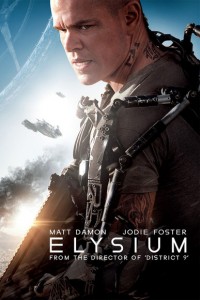Elysium
Posted on August 8, 2013 at 6:01 pm
 The best science fiction acts like a narrative Rorschach test, taking specific elements of our current condition, extrapolating into the future (usually dystopically), and allowing the audience to project our assumptions — and our fears — onto it. “Elysium” is a smart sci-fi thriller that bundles the action and visuals we want from big-budget sci-fi with some provocative ideas about the logical consequences of the decisions we make on some of today’s most contentious issues.
The best science fiction acts like a narrative Rorschach test, taking specific elements of our current condition, extrapolating into the future (usually dystopically), and allowing the audience to project our assumptions — and our fears — onto it. “Elysium” is a smart sci-fi thriller that bundles the action and visuals we want from big-budget sci-fi with some provocative ideas about the logical consequences of the decisions we make on some of today’s most contentious issues.
The word “elysium” means a place or condition of perfect happiness. Imagine a place of no worries, no illness, no want. There are endless, perfectly manicured green lawns and soft breezes lightly flutter the sheers on windows that look out on exquisite landscapes. That is home to the wealthy residents of “Elysium,” the space station. It orbits above the now-despoiled planet earth, where the 99 percent live Hobbesian lives that are brutal, nasty, and short. In other words, the set-up is “Wall•E” for grown-ups, without the “Hello Dolly” dance number and cruise ship atmosphere.
Max and Frey meet as children on Earth, and he promises to take her to Elysium some day. They grow up to be Matt Damon and Alice Braga, and meet again when he mouths off to a robocop, who breaks his arm, and she is a nurse in a health care system that provides only the most basic first aid for Earth residents while Elysians have access to a kind of tanning bed technology that cures all injuries and diseases and even reverses the effects of aging.
Max is exposed to a lethal dose of radiation at the plant where he works, making more robots to wait on the residents of Elysium and enforce the brutal restrictions on Earth. A robot informs Max that he will experience catastrophic organ failure and die in five days. The arrogant Elysian CEO in charge of the factory, John Carlyle (William Fitchner), is only concerned about whether Max will get the sheets dirty and how quickly he can be gone.
Max knows that breaking into Elysium and hacking into a med-bed is the only way he can stay alive. And the only way for him to get there is to do a job for his old boss, Spider (Wagner Moura), capturing some data from Carlyle. To keep Max strong, Spider’s henchmen surgically attach a cyber exo-skeletal device to his arms, spine, and skull. He gets help from Diego Luna, a highlight as Max’s old friend from the car-stealing days. It gives him extra power and a sort of USB plug in his brain. And it turns out that Frey also has a desperate reason to get to Elysium. And that the Secretary of Defense (Jodie Foster, dressed in spotless white) is in the midst of orchestrating a regime change, so the data downloaded into Max is of vital importance. She sends a scary operative with a lot of firepower (“District 9’s” Sharlto Copley, scary good) to get Max.
As he did with “District 9,” director Neill Blomkamp adds just enough allegory to this story to give extra weight to the heart-pounding action. Both of the worlds are thoughtfully conceived, especially the burned-out, graffiti-covered remains of Earth. The details are evocative and compelling — a robot asking blandly whether Max is using sarcasm, Spider’s hodgepodge lair with its hobbled-together computers. Foster’s recent performances have been disconcertingly mannered, with head-shaking to indicate the intensity of emotion. But Damon is top-notch as Max, terrific in the action scenes and even better as we see him becoming more human.
Parents should know that this film includes constant sci-fi peril and violence with some very graphic and disturbing images, many characters injured and killed, constant strong language, drugs, drinking, and smoking.
Family discussion: What elements of this story are based on current issues and controversies? Why did Max say no to Frey? Why was the story about the meerkat and the hippo important? What will happen next?
If you like this, try: “Upside/Down” and “Mad Max”
